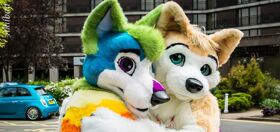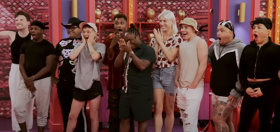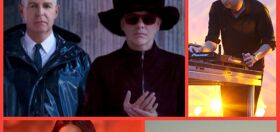 While images of gay couples raising children are entering the mainstream—thanks to advertising campaigns and same-sex celebrities—the reality that many of us have welcomed special-needs kids into our lives often goes unnoticed.
While images of gay couples raising children are entering the mainstream—thanks to advertising campaigns and same-sex celebrities—the reality that many of us have welcomed special-needs kids into our lives often goes unnoticed.
But David Upjohn and Andrew Daniels are certainly worthy of notice.
The couple, who live in Hastings in southern England, have been together for a quarter-century—and raising children with severe and sometimes terminal disabilities for 18.
Their first charge—a young boy—came to Upjohn, 59, and Daniels, 47, as an infant and passed away at 7 and 1/2. “He’d taught us so much and we’d developed so many skills,” Daniels told the Guardian. “We thought, we can’t just leave it. We’ve got to do something with this knowledge. That’s when we decided to carry on fostering children with profound disabilities and terminal conditions.”
How about we take this to the next level?
Our newsletter is like a refreshing cocktail (or mocktail) of LGBTQ+ entertainment and pop culture, served up with a side of eye-candy.
In 2002, Armand, a 6-year-old from the Congo joined their clan. He has significant learning disabilities, uses a wheelchair and must be fed through a tube. Weeks later, the guys were asked if they’d take in Luke, a 12-year-old with degenerative muscular dystrophy.
Over the years there has been ample joy and pain: A 3-year-old passed away just 10 days after her adoption was completed.
But their latest arrival, 3-year-old Emma, is thriving in their care.
“I love every minute of it. It really is wonderful to watch the children grow and develop,” says David. “Maybe sometimes you’re just looking for them to smile because the milestones are not the same as other families – where they start walking, they start feeding themselves, they get toilet-trained … we have none of that. We get excited when they smile and recognise us. Or maybe they turn their head at the appropriate moment. That’s a huge milestone for our children.”
Both in the UK and the U.S., gay face hurdles in fostering and adopting children, even when those kids have no where else to turn. It’s a tragic situation illustrated in the new indie film Any Day Now, and its one Daniels and Upjohn are all too familiar with.
“In the early days there were a number of children that we were likely to foster, and nothing happened,” recalls Daniels. “Then we found out later that a parent had said, ‘No, they’re not going there.’ But that was a long time ago.”
Today, they are raising four children, each of whom is battling life-threatening conditions. It’s led the family to adopt the philosophy, “that none of us know how long we’re going to be here, so we should make it as amazing as possible,” says Daniels. “That feeds into our lives as well. It gives life an amazing quality. It digs deep into a part of you that you didn’t know was there. ”




















2eo
Gay couples, helping the needy, isn’t there supposed to be state religions that do that, oh wait they’re busy spending all their money on making sure people are treat badly.
Good on them, doing good moral work. Kudos.
Dionte
I’m going to see Any Day Now right after work, even though I know royal oak is gonna be
crowded.
rcs831
My partner and I have been Live-In care providers for a gentleman with down syndrome and Autism named David for 10 years and eight years respectively. David is 31 and we absolutely LOVE what we do. Please watch this 6 minute film we made about what we do.
http://www.youtube.com/watch?v=vCCtz70pCPI
We ALL need to help each other out.
2eo
@rcs831: This is for you and your partner.
http://fc03.deviantart.net/fs71/i/2011/230/b/6/you_are_awesome_by_trueprince-d46zalu.jpg